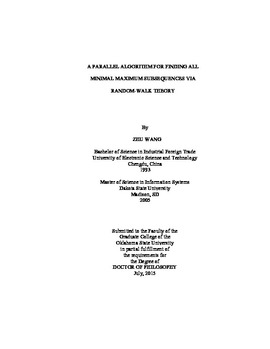| dc.contributor.advisor | Dai, H. K. | |
| dc.contributor.author | Wang, Zhu | |
| dc.date.accessioned | 2016-09-29T18:43:23Z | |
| dc.date.available | 2016-09-29T18:43:23Z | |
| dc.date.issued | 2015-07 | |
| dc.identifier.uri | https://hdl.handle.net/11244/45326 | |
| dc.description.abstract | A maximum contiguous subsequence of a real-valued sequence is a contiguous subsequence with the maximum cumulative sum. A minimal maximum contiguous subsequence is a minimal contiguous subsequence among all maximum ones of the sequence. Time- and space-efficient algorithms for finding the single or multiple contiguous subsequences of a real-valued sequence with large cumulative sums, in addition to its combinatorial appeal, have major applications such as in bioinformatics, pattern matching, and data mining. We have designed and implemented a domain-decomposed parallel algorithm on cluster systems with Message Passing Interface that finds all minimal maximum subsequences of a random sample sequence from a normal distribution with negative mean. We find the structural decomposition of the sequence with overlapping common subsequences for adjacent processors that allow hosting processors to compute the minimal maximum subsequences of the sequence independently. Our study employs the theory of random walk to derive an approximate probabilistic length bound for common subsequences in an appropriate probabilistic setting, which is incorporated in the algorithm to facilitate the concurrent computation of all minimal maximum subsequences in hosting processors. We also present an empirical study of the speedup and efficiency achieved by the parallel algorithm with synthetic random data. | |
| dc.format | application/pdf | |
| dc.language | en_US | |
| dc.rights | Copyright is held by the author who has granted the Oklahoma State University Library the non-exclusive right to share this material in its institutional repository. Contact Digital Library Services at lib-dls@okstate.edu or 405-744-9161 for the permission policy on the use, reproduction or distribution of this material. | |
| dc.title | Parallel algorithm for finding all minimal maximum subsequences via random-walk theory | |
| dc.contributor.committeeMember | Heisterkamp, Douglas R. | |
| dc.contributor.committeeMember | Samadzadeh, Mansur H. | |
| dc.contributor.committeeMember | Fan, Guoliang | |
| osu.filename | Wang_okstate_0664D_14114.pdf | |
| osu.accesstype | Open Access | |
| dc.type.genre | Dissertation | |
| dc.type.material | Text | |
| thesis.degree.discipline | Computer Science | |
| thesis.degree.grantor | Oklahoma State University | |
